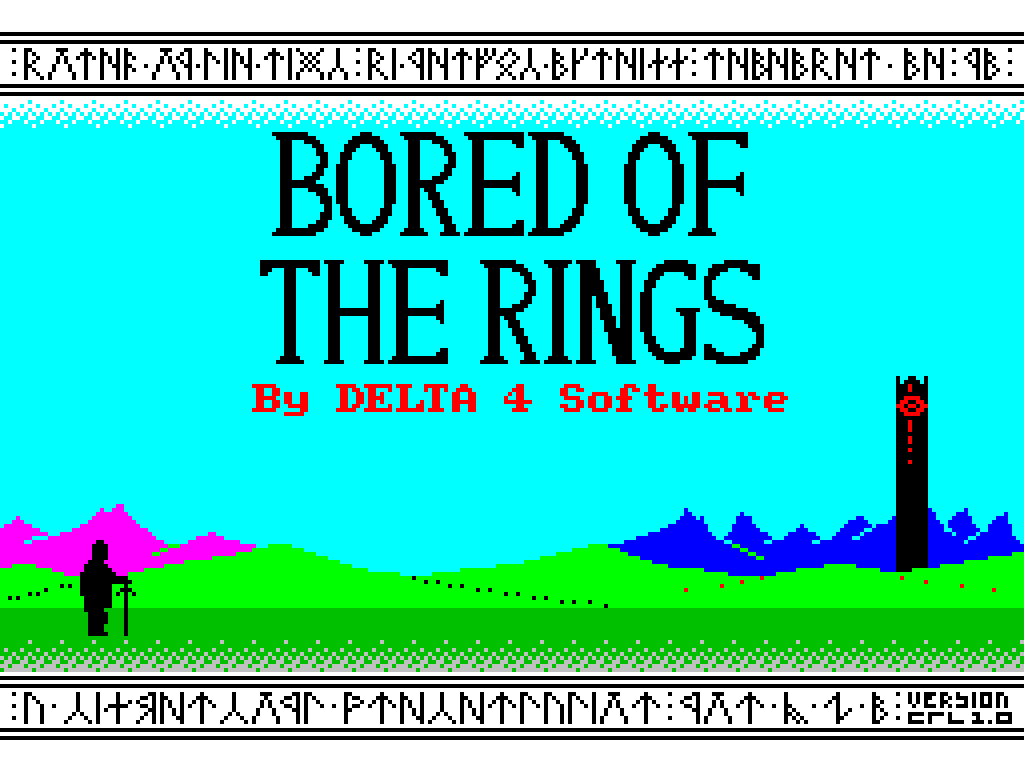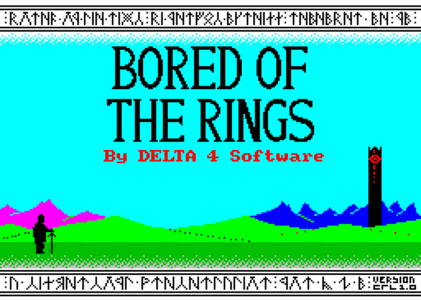“Bored of the Rings,” released in 1985 by Delta 4 Software, is a unique text adventure game that parodies J.R.R. Tolkien’s epic saga, “The Lord of the Rings.” This game, developed by Fergus McNeill, was published for platforms such as the Commodore 64, ZX Spectrum, and Amstrad CPC, among others. It is based on the parody novel of the same name by Harvard Lampoon, which humorously twists Tolkien’s narrative into a comical adventure.
Gameplay and Plot
In “Bored of the Rings,” players embark on a journey as Fordo the Boggit, accompanied by his companions Spam, Pimply, and Murky, to destroy the Great Ring in Mount Gloom. This parody keeps the humor alive with character names like Legoland the Elf and Aragont, and locations such as the “featureless plain below the pink mountain” and “Lake Anadin.” The game is split into three parts, requiring players to use passcodes to advance from one section to another. Players interact with the game through a text parser system, entering commands in the form of verb-noun phrases to explore the world and solve puzzles.
Humorous Elements
The humor in “Bored of the Rings” is pervasive, from its character names to its dialogues and descriptions. Here are some notable examples:
- Character Names: The main character, Fordo the Boggit, is a direct parody of Frodo Baggins. His companions include Spam (Sam), Pimply (Pippin), and Murky (Merry), playfully mocking their original counterparts. Other characters like Legoland the Elf (Legolas) and Aragont (Aragorn) continue this trend of humorous renaming.
- Location Names: The game transforms the epic landscapes of Middle-earth into comical versions. For instance, the “featureless plain below the pink mountain” replaces the majestic plains and mountains of Tolkien’s world. “Lake Anadin” and the “Land of the Personal-Stereo-Wearing Goblins” add to the absurdity.
- Dialogue and Descriptions: The text descriptions in the game often contain humorous asides and jokes. For example, when encountering enemies or obstacles, the game might describe them in a tongue-in-cheek manner, poking fun at the high stakes and intense atmosphere of typical fantasy adventures.
- Narrative Situations: The scenarios players find themselves in are often ludicrous. For example, Fordo might have to navigate through a forest filled with hippies instead of the usual menacing creatures, or he might encounter anachronistic items like personal stereos, adding a layer of absurdity to the quest.
Development and Reception
The game was developed using The Quill, a popular game creation tool for text adventures at the time. The inclusion of static graphics in certain locations added a visual element to the text-based gameplay. “Bored of the Rings” was well-received for its humor, though reviews noted that the gameplay itself could be somewhat limited. For instance, Zzap!64 awarded it a 78%, praising its comedic elements but criticizing its gameplay mechanics.
Critical reception highlighted the game’s strong points in humor and creative writing. However, the gameplay, relying heavily on the text parser interface, was seen as challenging and occasionally frustrating. Players needed to figure out the exact wording the game required to progress, which could lead to trial and error. Despite this, the game’s charm and wit earned it a place in the hearts of many players.
Legacy
“Bored of the Rings” stands out not only for its playful take on a beloved fantasy epic but also for its place in the history of interactive fiction. It spawned a sequel, “The Boggit,” which continued the tradition of parodying Tolkien’s works with a humorous twist. Despite its age, “Bored of the Rings” remains a beloved title among retro gaming enthusiasts and is accessible on various abandonware sites for those interested in experiencing its quirky narrative and gameplay.
The game’s influence can be seen in its lasting appeal among retro gamers and its inspiration for future parody works. Its success demonstrated the potential for humor in video games and opened the door for more games that didn’t take themselves too seriously. Additionally, the game is a notable example of early interactive fiction, a genre that paved the way for more complex storytelling in video games.
Similar Games

“Bored of the Rings” is part of a rich tradition of humorous and parody video games that playfully subvert well-known genres and stories. Here are a few notable examples:
- The Boggit: Another creation by Delta 4 Software, this game continues the parody trend by spoofing “The Hobbit.” Players navigate through a humorous and absurd version of Bilbo’s adventure, encountering comical twists on familiar characters and settings.
- Kingdom O’ Magic: Developed by Fergus McNeill, the same mind behind “Bored of the Rings,” this game parodies a wide range of fantasy tropes. It features a whimsical storyline with over-the-top characters and a satirical take on classic fantasy quests.
- Discworld Series: Based on Terry Pratchett’s beloved book series, these adventure games are filled with the same witty humor and satirical observations found in the novels. The games follow Rincewind the wizard in a series of humorous escapades.
- Monkey Island Series: Known for their sharp wit and clever puzzles, the “Monkey Island” games by LucasArts follow the adventures of Guybrush Threepwood, a bumbling pirate wannabe. The series is celebrated for its comedic writing and memorable characters.
- Hitchhiker’s Guide to the Galaxy: This text adventure game, co-written by Douglas Adams, brings the absurd and humorous universe of the book series to life. Players must navigate through a series of bizarre and humorous scenarios, capturing the spirit of Adams’ writing.
Similar Games Based on Tolkien’s Work
The world of J.R.R. Tolkien has inspired numerous video games over the decades. Here are some of the notable titles that have brought the rich lore of Middle-earth to life:
- The Lord of the Rings: The Two Towers (2002) Developed by Stormfront Studios and published by Electronic Arts, this game was one of the first to blend footage from Peter Jackson’s film adaptations with hack-and-slash gameplay. Players can experience iconic battles from the movies, utilizing special attacks to fight hordes of orcs and Uruk-hai.
- The Lord of the Rings: The Return of the King (2003) Building on the success of The Two Towers, this game offered a longer campaign and more playable characters like Gandalf. It featured unreleased footage from the film, enhancing its appeal to fans. The co-op gameplay allowed players to team up for the epic quest.
- The Lord of the Rings: Battle for Middle-earth II (2006) This real-time strategy game by EA Los Angeles lets players command the armies of Middle-earth in large-scale battles. The game features campaigns for both Good and Evil factions, providing a comprehensive strategy experience set in Tolkien’s world.
- The Lord of the Rings Online (2007) An MMORPG that allows players to explore Middle-earth in great detail. Developed by Standing Stone Games, it offers various races and classes, letting players undertake quests and explore locations from the Shire to Mordor. The game remains popular and has received numerous expansions.
- Middle-earth: Shadow of Mordor (2014) Developed by Monolith Productions, this action RPG introduces an original story set between The Hobbit and The Lord of the Rings. The game features the innovative Nemesis system, where enemies remember past encounters with the player, adding a unique depth to gameplay. Its sequel, “Middle-earth: Shadow of War,” continues the story with even more expansive gameplay.
- LEGO The Lord of the Rings (2012) A family-friendly adaptation developed by Traveller’s Tales, this game combines the LEGO franchise’s signature humor with the epic narrative of Tolkien’s trilogy. Players can explore Middle-earth, reenacting scenes from the films in a playful LEGO style.
- The Lord of the Rings: Gollum (2023) Developed by Daedalic Entertainment, this game focuses on the character Gollum and his adventures before the events of The Lord of the Rings. Despite facing delays and mixed reviews, it offers a unique perspective on the story through the eyes of one of its most complex characters.
Bored of the Rings
Overall, “Bored of the Rings” is a delightful blend of fantasy and humor that offers a light-hearted take on the serious quest narrative popularized by Tolkien, making it a memorable piece in the history of video game parodies. Its clever writing, humorous reinterpretation of a classic story, and pioneering role in interactive fiction ensure its place in gaming history.













